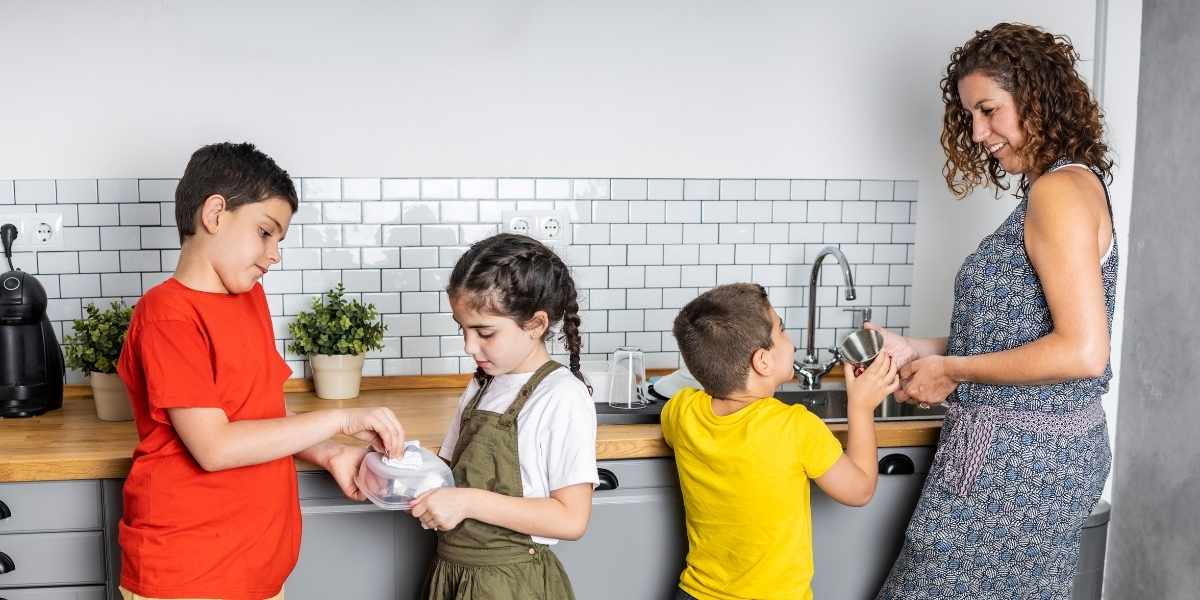Contents
Quite often we focus too much on the academic progress of our children and lose track of the basics. After all, what use is understanding quantum physics if you don’t know how to clean yourself, follow a healthy diet or socialise with friends? It was recently reported that nine out of ten parents feel that their children are lacking domestic skills. As adults, it is our job to teach children the domestic skills they need to go ahead and lead a healthy and fulfilling life. But what are those skills? Let’s find out.
Hygiene
Kitchen 🥄
Anyone who has experienced a shared kitchen at university as an undergraduate will probably remember that one person who didn’t know how to keep basic hygiene. Raw meat left uncovered, mouldy pots and pans and forgotten food that’s long out of date. We might take it for granted, but if we don’t teach children about what they need to do to keep their kitchen hygienic can we really be surprised when they end up with food poisoning on week two of university?
A good starting point would be our blog post about the three best cooking ideas for children! 👩🍳
Personal 🛁
Parents regularly have the ‘change your underwear’ or ‘brush your teeth’ conversations – and this is good! The last thing we want is for children to not understand the basic levels of personal hygiene needed to become healthy and fully functioning adults. The most important thing that we can do is to model healthy personal hygiene and to explain to children why it’s important that they do the same.
For most children, smelling like a hippie from the 70s isn’t ideal. Aside from the health problems that can result from a lack of cleanliness, there are also lots of social problems children might encounter if they smell bad – it is sad but true. 🤷
Lots of parents these days don’t like the idea of using environmentally irresponsible chemicals to clean. Thankfully, there has been a boom in eco-friendly hygiene products from soap to period products which allow you to teach your children about personal hygiene without compromising on your environmental principles. Even the delegates to the COP26 will be washing themselves with locally produced eco-friendly soap! 🌱🧼💪
Compassion
Compassion towards others
Whilst compassion is not traditionally seen as a ‘skill’, we very much believe that it is something, which like any skill, can be taught and improved with practice. If we don’t teach our children to be kind and compassionate, we cannot expect them to be kind or compassionate – while it might be in our nature, so are many other things which might make us slightly less than kind or compassionate. Many people will teach their children manners but not compassion.
A compassionate child with the ability to sympathise and empathise is more likely to be a happy child; happy children tend to be better at having meaningful social interactions and connections to achieving higher academic results.
Self-compassion
As well as being compassionate to the environment and those around us, we need to know how to be kind to ourselves. Too many children are too harsh on themselves and don’t know how to be self-compassionate. Here is our advice on how to help your teen love their body.
Safety
Many people will argue that, in order to be safe, children need to be taught some level of self-defence. Arguably, this depends very much on the environment in which your child is growing up. We believe that rather than teaching your child self-defence, it is better to teach them how to avoid dangerous situations or – if they find themselves in one – how to get out of them as safely as possible.
You shouldn’t be teaching your child ninja kicks or karate chops before having a healthy conversation about safety. If your child sees themselves as a superhero, they are more likely to get into trouble than if they are taught that they can avoid dangerous situations by following best practice.
Here are our top tips for keeping children safe:
- Tell people where you are going
- Stay as part of a group
- Do not walk down poorly lit areas – generally try and avoid darkness
- Do not talk with strangers
- Tell an adult at home or at school if a stranger ever tries to approach you
- Never accept food or drink from anyone you do not know and trust
If you do feel the need to teach your child about self-defence, it is important to emphasise that – if possible – flight is almost always a better option than fight.
At GoStudent we realise that your child is more than an exam-machine. We want all of the pupils we work with to be happy, healthy and well-rounded individuals. Read through our blog posts to get more ideas about ways in which you can support your child both academically and pastorally from the benefits of outdoor learning to how to develop their creative writing!









